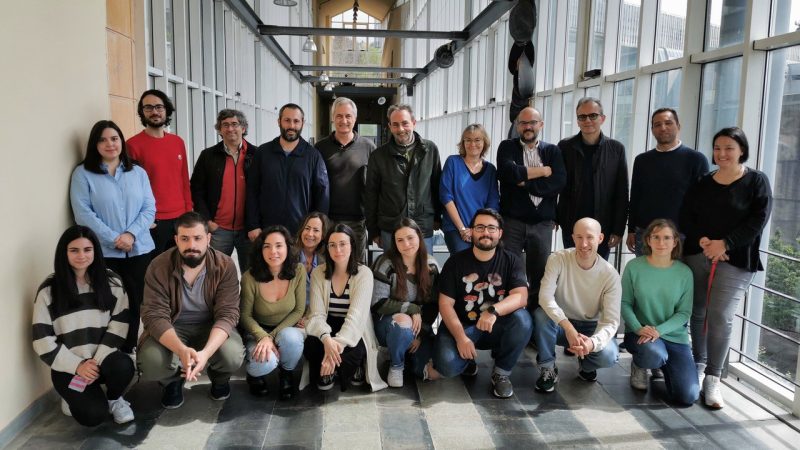This is a meeting of the G-Bike Project in which more than 120 researchers from 42 countries are taking part
Researchers from 18 countries are currently participating in a workshop on the role of hybridisation in nature on the Vigo campus. This meeting is part of the G-Bike project, an international network composed of more than 120 researchers from 42 countries, which aims to advance knowledge and the development of methods and tools to assess, monitor and manage genetic diversity in order to preserve the resilience and adaptive potential of species, both in natural populations and in captivity.
This project started in 2019 and will end next autumn, in the framework of the COST (European Cooperation in Science and Technology) action, which seeks to promote interaction between research staff, establishing collaborations and organising meetings such as the one this week in Vigo and funding research stays in other laboratories. The CIM-UVigo is represented in G-Bike by the Population Genetics and Cytokinetics Group and, specifically, by the scientists Armando Caballero, Paloma Morán, Emilio Rolán-Alvarez, Ángel Pérez Diz and Juan Galindo. The latter explains that “there is currently great interest on the part of researchers in the resilience of ecosystems”, something that is due, he points out, to the rapid changes that ecosystems are undergoing due to anthropogenic effects, both direct (such as pollution or loss of habitats) and indirect (such as climate change or ocean acidification). As the scientist explains, “a resilient ecosystem requires the adaptive capacity of the species that compose it to the changes that occur, mainly environmental. Diversity at the genomic level of a species or population is fundamental from the point of view of its conservation, both from an adaptive perspective and from the negative effects that the loss of genetic diversity may entail”.
An urgent task in the face of climate change
Although genetic data can be obtained for most organisms, progress is needed in standardising protocols for detecting and monitoring the genetic diversity of species and their adaptation potential. It is in this context that G-BiKE is working, with the aim of helping scientists and practitioners across the EU, and in particular in the countries targeted for inclusion in the COST action, “to integrate genetic and evolutionary knowledge into conservation planning policies and to promote transboundary management and long-term monitoring programmes of evolutionary potential to ensure the persistence of populations and species and, ultimately, the continued provision of nature-based ecosystem services”. Given the drastic impacts of climate change over the coming decades, its promoters stress, “G-BiKE is especially urgent”.
Among the work objectives set to be developed over the three years of the project are to convey “clearly” to managers how genetic diversity can support ecosystems; develop and test best practice protocols for monitoring genetic diversity in time and space; provide an online forum on emerging tools; connect all stakeholders through networking and capacity building opportunities; build a network of conservation genetics laboratories; and lay a foundation for long-term impact.
Two days to delve into the benefits and threats of hybridisation
The event being held at the Faculty of Biology this week under the title ‘Hybridization: diversity, conservation and ecosystem services’ involves 38 G-BIKE researchers from Albania, Germany, Austria, Belgium, Bosnia Herzegovina, Bulgaria, Denmark, Slovenia, France, Greece, Norway, the Netherlands, Poland, Portugal, Serbia, Switzerland, Turkey, the United Kingdom and Spain, both in person and remotely.
It aims to put into perspective the benefits and threats that can be caused by hybridisation processes, both within and between species, the latter being increasingly common. “Hybrids, individuals descended from reproduction between two genetically differentiated species, subspecies or populations (such as different fish stocks or plant varieties) represent in most cases serious threats to ecosystems and thus to the conservation of biodiversity and ecosystem services,” they note. A large part of these hybridisation processes are directly related to the effect of humans, such as hybridisation between wild boars and domestic pigs, say the researchers, “but other hybridisation processes are related to climate change that affects the distribution of species”, causing species, subspecies or stocks that were not in contact to come into contact with each other to hybridise. However, hybridisation can also have beneficial effects, as in the case of adaptive introgression, which, as the scientists explain, consists of a species acquiring an adaptive character, such as drought resistance, by hybridising with another species. Furthermore, they add, hybridisation can also be used in “genetic rescue”, when an endangered species hybridises with another population or nearby species to increase the genetic variation of the endangered species.
During these two days, the participants in this symposium will discuss all these aspects related to hybridisation and will elaborate a review article that integrates them and that will help nature managers to make decisions. Juan Galindo, Paloma Morán and Ángel Pérez Diz from the CIM-UVigo will take part in these sessions and will address aspects related to hybridisation processes in marine gastropods, salmonids and mussels, respectively.
The research activity of the CIM is supported by the Xunta de Galicia and the European Union, through its co-financing under the Galicia ERDF Operational Programme 2014-2020.
Source: DUVI

